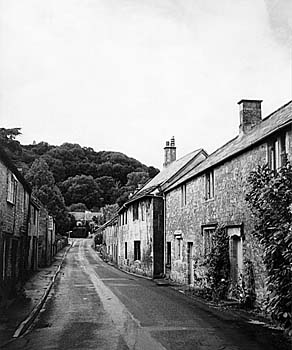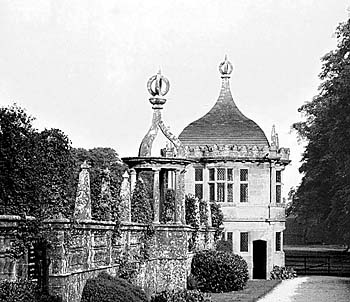A Story of Interior Passion:
Wood and Stone by John Cowper Powys
This is an astonishingly brilliant first novel, first published in 1915. It would be amusing to submit it for the Booker Prize — surely it would win. But more to the point, a publisher must be persuaded to put it back in print. My own copy is a paperback facsimile edition issued courageously by Village Press in 1974. I want to proclaim "Better than Lawrence, Conrad, Joyce! Better than Proust! Better even than some of his own later novels!" But I won't because I don't have the credentials.
His plot is well-crafted and gripping, with suspense maintained through seven hundred pages of twists and turns. There is a wonderful array of memorably-evoked scenes, grand, comic, tragic and pathetic. His language builds atmosphere through the precise detail of his observations, but enchants through its music, its breadth and its honesty. He writes the purest and most expressive English, about the seasons, about trees, plants, clay and stone, and the influences they have on his characters:The blossom of the blackberry bushes was already giving place to unripe fruit, and the berries of traveller's-joy were beginning to turn red. Hips and haws still remained in that vague colourless state which renders them indistinguishable to all eyes save those of the birds, but the juicy clusters of the common night-shade — "green grapes of Proserpine" — greeted the wanderer with their poisonous Circe-like attraction. from their thrones of dog-wood and maple, and whispered of the autumn's approach.The publisher's blurb on the Village Press edition defeats its own object by calling it a "sombre and impressive novel". It's much more than that. The madness and subsequent accidental death of James Andersen do cast a long sombre shadow on the reader's memory, but are just one thread of many interlaced themes in this work of multiple dimensions.
In an extraordinary preface, Powys proposes that Nietzsche might be right, up to a point, in distinguishing different kinds of man. Maybe insights can be gained from dividing mankind between the strong-willed dominant types, and those "Pariahs" whose slave mentality might today label them as "losers" or "victims".In that particular corner of the West Country, so distinct and deep-rooted are the legendary survivals, it is hard not to feel as though some vast spiritual conflict were still proceeding between the two opposed Mythologies — the one drawing its strength from the impulse to Power, and the other from the impulse to Sacrifice.But he's prepared to subvert Nietzsche and examine in depth the interior life of his Pariahs, for it could be "at least as interesting". The Mythology of Sacrifice is not to be airily dismissed, and Powys judges victory by aesthetic criteria alone. His main sympathies are with the underdogs. In his pamphlet, The Secret of Self-Development (Village Press, 1974), he passionately advocates "self-culture" via reading great literature, but cautions:Self-culture in the true sense does not by any means necessarily make for pleasure or comfort. Sometimes it makes for suicidal misery.... For the truth is that what we call self-culture is simply a heightening of the life-consciousness in us.
 |
|
with St. Michael's Hill ("Nevilton Mount") in the background |
In the village of Nevilton, based on the Montacute of his childhood, Powys creates some extraordinary characters. Amongst the "Pariahs" are the craggy eccentric Quincunx, who lives alone and digs potatoes in his garden:
The lighting of his fire in the morning, the crackling of the burning sticks, and their fragrant smell, gave Mr Quincunx probably as much pleasure as anything else in the world.There's the timid, vulnerable Lacrima Traffio, a natural victim for the sadistic magnate Mortimer Romer:
... the Pariah does not venerate the Power that oppresses him. He despises and hates it. Long-accumulated loathing rankles in his heart. He is crushed but not won. He is penned, like a shorn sheep; but his thoughts "wander through Eternity".
The first time he had encountered Lacrima Traffio, he had been struck by her appealing eyes, her fragile figure, her frightened gestures.There's the saturnine James Andersen, whose passions run so deep that they touch insanity, as inherited from his mother. There's a frail and sickly maiden, Ninsy Lintot, whose unrequited love for James is balanced by his own unrequited love for Lacrima. Hugh Clavering is the young vicar tortured with lust for the flirtatious Gladys, who comes to him for religious instruction:
'Yet is it not my duty to look at her?' the Devil in his heart whispered. 'How can I teach her, how can I influence her for good if I do not see the effect of my words? Is it not an insult to the Master himself, and his divine power, to be thus cowardly and afraid?'
There's a mad girl, Nance Purvis, whose cries can be heard in the lonely woods, near the sinister Auber Lake, where various characters converge one moonlit night. There's a kind of village "bag lady", Witch Bessie, with her herbs, insight and cunning:"What be she then, with her Jezebel face and her shameless looks?" Round to back door, is it 'ee 'd have me sent? I do know who you be, well enough, Master Clavering, and I guess this gentleman be him as they say does bide here; but what be she, tricketed up in them outlandish clothes, like a Gypoo from Rogertown Fair? Be she Miss Gladys Romer, or baint she?"On the side of Power are the manipulative businessman Mortimer Romer; his bullying daughter Gladys; Luke Andersen, James' brother, who works for Romer and has Gladys running after him, whilst keeping several village girls in his sights:The young stone-carver, with his classic profile and fair curly hair, might have passed for a disguised Dionysus seducing to his perilous service the women of some rustic Thessalian hamlet.Other characters (who don't quite fit either category) include Vennie Seldom, who yearns to become a nun:I think the world is really a dark and dreadful place.... I cannot help saying so. I know there are people who see only its beauty and joy. I cannot feel like that. If it wasn't for him [Christ] I should be utterly miserable.and the gross and primitive John Goring, who has been promised Lacrima's hand in marriage:It was not long before the tragic sobs of the unhappy Lacrima, borne across the field on the east-wind, arrested the farmer's attention. He stood still, and listened, snuffing the air like a great jungle-boar.But the result is not a melodrama, though wit, morality, drama and satisfactory resolution of the plot's loose ends are all prominent in the novel. The action, brilliant characterisation and marvellous descriptions of nature are not the core of the novel's energy and genius. A recent remark by Charles Aznavour expresses a sentiment that applies in a special way to Powys:
... 'Not so quick, lassie, not so quick,' he said. 'Those that come into farmers' fields must not be too proud to pass the time of day with the farmer.'"... and anyway it was never sex that really interested me. It was la passion intérieure."Wood and Stone, belying the materiality implicit in its title, fizzes with the interior passion of its characters which shapes their deeds. Many of them are bachelors and eligible maidens. Glen Cavaliero (In John Cowper Powys: Novelist, Clarendon Press, 1973) writes of a later novel: "The book is a network of erotic attraction, and odd relationships", and the same could be said of Wood and Stone. But you get the feeling that the author's intention is to chart his own soul, or as Powys himself averred, "to escape the stresses and strains of his own complex personality". (Cavaliero, op. cit.) He has the gift of informing every sentence with the joy of his deeply personal act of creation, yet without being in any normal sense autobiographical. In all of his characters, what makes them so real — however varied and sometimes grotesque — is some spark of the author's own feeling or viewpoint. He doesn't just invent a motley collection of fascinating characters and imagine how they interact, against a brilliantly evoked backdrop of village life; he enfolds them in an overarching set of supernatural influences whose origins are lost in myth. The names of his gods are Stone, representing a primeval paganism, and Wood, representing the Cross and hence the subtler power of Christianity.
 | ||
of St. Andrew's at Stoke Sub Hamdon ("Athelston") | ||
Powys, son of a country parson, sees the various denominations of Christianity as influences, like those of Nature. His art is inclusive, generous and able to reflect upon itself:Art, alone, — that mysterious daughter of Life, — has the secret of following the incalculable movements of the Force to which she is so near akin.(...)In Wood and Stone, Powys writes within a formal style that owes much to the Greek and Latin classics, in its magisterial comment on the scenes described, in its linking of moods and events to geography, Nature and distant cosmic influences. But his outlook is uncompromisingly personal: what he describes is not England, for all its sparkling description, but his own soul.
Art must prove itself able to evoke the very tang and salt and bitter-sweetness of the actual pell-mell of life — its unfolding spaces, its shell-strewn depths.... She must hold fast to poetry and humour, and about her creations there must be a certain spirit of liberation, and the presence of large tolerant after-thoughts.
 | ||
which flank the garden to the East of Montacute House | ||
His village of Nevilton (Montacute) is defined within the conventional class structure of its time, using the language and attitudes of the educated classes. Whilst he embraces those from the less educated orders with equal affection, they are notably less able to express themselves and their interior life is not revealed. This is in contrast with Weymouth Sands, e.g. the interior monologue in which the young gypsy orphan, Larry Zed, consummates the spiritual ravishment of Perdita.
A propos Weymouth, one affectionate chapter describes a day trip to this seaside resort which was to become the location of his later novel. We forgive the author the "self-indulgence" of descriptions which don't advance the plot but are poetic evocations in their own right:Especially did he love the sun-bathed atmosphere, so languid with holiday ease, which seemed to float in and out of the open lodging-house entrances, where hung those sun-dried sea-weeds and wooden spades and buckets, which ever-fresh instalments of bare-legged children carried off and replaced.One of the most appealing aspects of Powys is that all his writing is, in a special way, self-indulgent. He writes for his own pleasure, for the sheer joy of the ideas, the creation, the precise evocation of scenes and feelings; the assertion of his unusual sensibility. Of course he also writes to share his creation and in this he is supremely successful. I quote again from the blurb to the 1974 edition:... his first "crazy romance", written years earlier to amuse himself and his friends, never appeared in print...Wood and Stone has appeared in print, but only just. Publisher please step forward! It's a big novel in every sense and it's only possible to convey some of its virtues in a short space. It is one of the glories of English literature; surely its time has come at last.
Ian Mulder
Born in Australia, Ian Mulder has lived in England for many years. Having for health reasons retired early from professional life he plans to spend the remainder of his youth seeking a vocation.
|
|